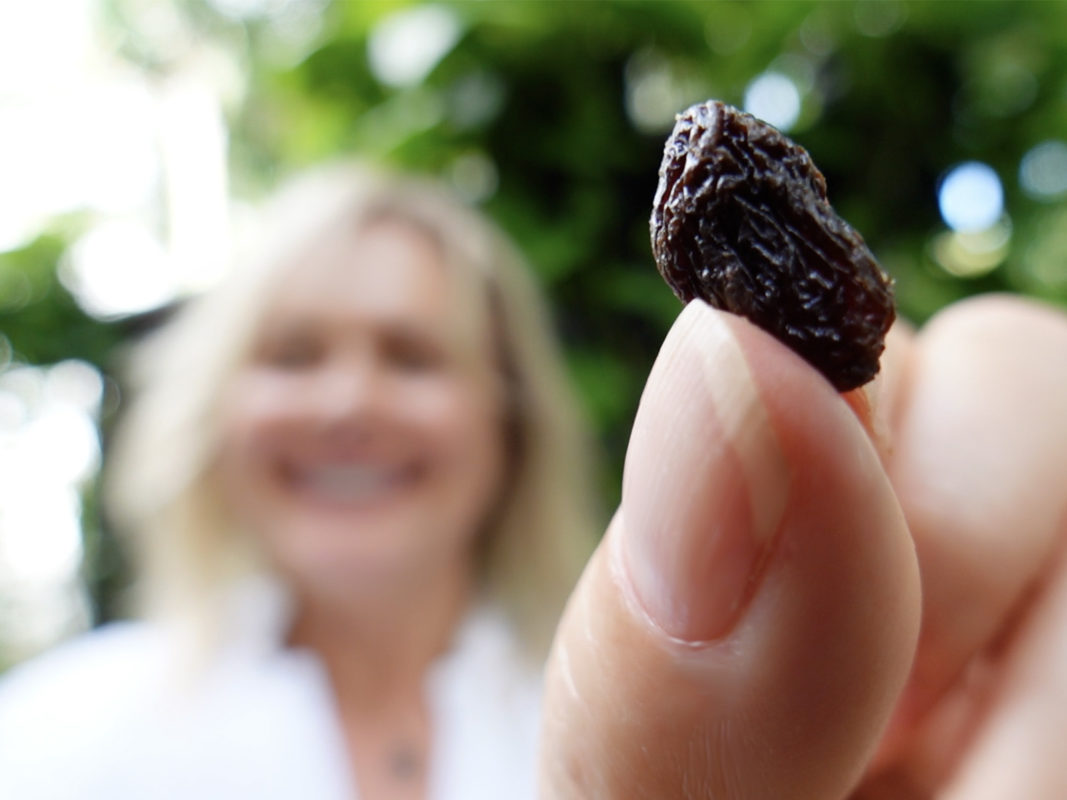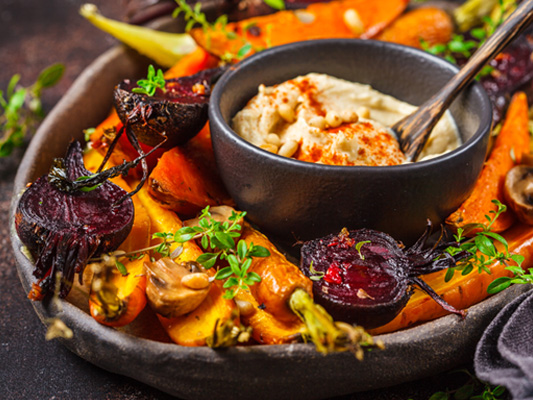Mindful Eating Meditation is a powerful tool for cultivating awareness and presence in our daily lives. By paying attention to the sensory experiences that come with eating, we can gain a deeper appreciation for the food we consume and the ways in which it sustains us. With practice, this technique can help us to break free from unhealthy patterns of thought and behavior, and live more fulfilling and satisfying lives.
The Raisin Experience: Savoring the Moment
From a Mindfulness teacher’s perspective, it’s essential to understand that our thoughts and internal processes are powerful tools for change, but they can also be obstacles to living a fulfilling life. By becoming more aware of our thoughts, emotions, and physical sensations, we can begin to break down the barriers that keep us from experiencing true happiness and well-being.
Eating is one area of life where we tend to operate on autopilot, without fully experiencing the moment-to-moment sensations that come with it. Mindful eating meditation is an excellent way to cultivate awareness and presence while enjoying one of life’s most fundamental pleasures. By slowing down and paying attention to the sensory experiences that come with eating, we can gain a deeper appreciation for the food we consume and the ways in which it sustains us.
During mindful eating meditation, we can learn to tune in to the cues that our bodies give us, indicating when we are hungry and when we are full. By doing so, we can avoid overeating and begin to develop a healthier relationship with food. With practice, we can use this technique to gain insight into the ways in which our thoughts and emotions can influence our eating habits, and make positive changes that support our overall well-being.
Mindful eating meditation is a powerful tool for cultivating awareness and presence in our daily lives. By paying attention to the sensory experiences that come with eating, we can gain a deeper appreciation for the food we consume and the ways in which it sustains us. With practice, this technique can help us to break free from unhealthy patterns of thought and behavior, and live more fulfilling and satisfying lives.
Mindful Eating Meditation
Reflections on Mindful Eating: The Raisin Experience
Reflections after the meditation can be incredibly powerful for developing mindfulness skills. When we take time to reflect, we can start to notice the changes that mindfulness practice can bring to our lives. Eating meditation is a great way to start developing this reflective awareness.
The Raisin Exercise Reflection Questions.
How is this different from the way you usually eat?
What actually changes when you’re eating mindfully?
Is slowing down and paying attention to your food resolved in a more pleasurable experience?
When was your attention during this eating meditation?
Many people find that eating mindfully is very different from the way they usually eat. Most of us tend to eat on autopilot, barely aware of what we’re putting in our mouths. Eating mindfully, on the other hand, means slowing down and paying attention to the sensory experience of eating. When we eat mindfully, we engage all of our senses – sight, smell, taste, touch, and even sound – in the experience of eating. We notice the colors and textures of our food, the aromas and flavors, and the sensations in our mouths and throats. We savor each bite, taking time to fully appreciate the taste and texture of our food.
What changes when we eat mindfully? First of all, we tend to eat more slowly, which can lead to a greater sense of satisfaction and fullness. When we eat quickly, we often don’t give our brains enough time to register that we’re full, which can lead to overeating. But when we eat mindfully, we savor each bite and take time to enjoy the experience, which can help us feel more satisfied with less food.
Another change that can happen when we eat mindfully is a greater appreciation for the food itself. When we’re paying attention to the sensory experience of eating, we start to notice the flavors, aromas, and textures of our food in a new way. We may even start to notice things we never noticed before, like the way different foods taste together or the subtle flavors of spices or herbs.
During this eating meditation, where was your attention?
Did you notice any differences in your experience of eating?
Did you notice any changes in the way you felt after eating mindfully?
These are all questions to consider as you reflect on your experience.
Developing a reflective awareness through mindfulness practice can help us notice the changes that happen in our lives. Eating meditation is a great way to start developing this awareness, as it allows us to slow down and pay attention to the sensory experience of eating. By eating mindfully, we can experience greater satisfaction, appreciation for our food, and even physical health benefits. So, the next time you sit down to eat, try to slow down and pay attention to the experience – you may be surprised by what you discover.

Bite by Bite: Cultivating Awareness and Appreciation through Mindful Eating
I’m a big fan of eating meditation. It’s a super simple practice that can have a huge impact on our lives. When we eat mindfully, we’re able to fully appreciate the experience of eating, which can be seriously life-changing.
You see, we live in a world where it’s easy to get caught up in multitasking while eating. Whether we’re scrolling through Instagram, watching Netflix, or answering emails, we’re not really paying attention to the food we’re consuming. But this can lead to overeating and not fully enjoying our food.
That’s where eating meditation comes in. By slowing down and really savoring each bite, we can develop a deeper appreciation for the flavors, textures, and sensations of our food. Plus, we’re less likely to overeat because we’re more in tune with our body’s signals of fullness.
And the benefits don’t stop there! Eating meditation can also help us make healthier food choices and improve our digestion. By bringing greater awareness to the experience of eating, we can learn to tune in to what our body really needs.
I love guding eating meditation to help people get more out of their practice. By learning to pay attention to their thoughts, feelings, and bodily sensations while eating, we gain a greater understanding of how our emotions and environment impact our eating habits. This can help us cultivate a more mindful approach to their daily lives.
Every time I sit down to eat, I’m practicing eating meditation. You can try it too. Take a deep breath, focus on the food in front of you, and savor each and every bite. You might just be surprised at how much more enjoyable the experience can be!
When we practice eating meditation, we’re not just nourishing our bodies; we’re also exercising our mindfulness muscles. This technique helps us improve our focus, clarity of perception, and emotional stability, all of which are important in the world of mindfulness and Vipassana practice.
Eating meditation isn’t a new idea, either. It’s a practice that has been used in Vipassana and Zen Buddhism for centuries. In fact, Zen eating meditation has its own formal name: oryoki. But it’s not just limited to these traditions. Even prayer before meals can be seen as a type of eating meditation, as it helps us pause and direct our attention to the sacredness of the act of eating.
So, next time you sit down to eat, why not try out some simple eating meditation techniques and see how it feels for you? Who knows, you might just find that you’re able to savor your food more fully and feel more connected to your body and senses.
Be Alive 🌱
Love ❤️, Julia
GUIDED MEDITATIONS 💗
Mindful Eating 🥢
DISCLAIMER: The materials and the information contained on the Positive Pranic website are provided for general and educational purposes only and do not constitute any legal, medical, or other professional advice on any subject matter. None of the information on our videos is a substitute for a diagnosis and treatment by your health professional. Always seek the advice of your physician or other qualified health providers prior to starting any new diet or treatment and with any questions you may have regarding a medical condition. If you have or suspect that you have a medical problem, promptly contact your health care provider.


























